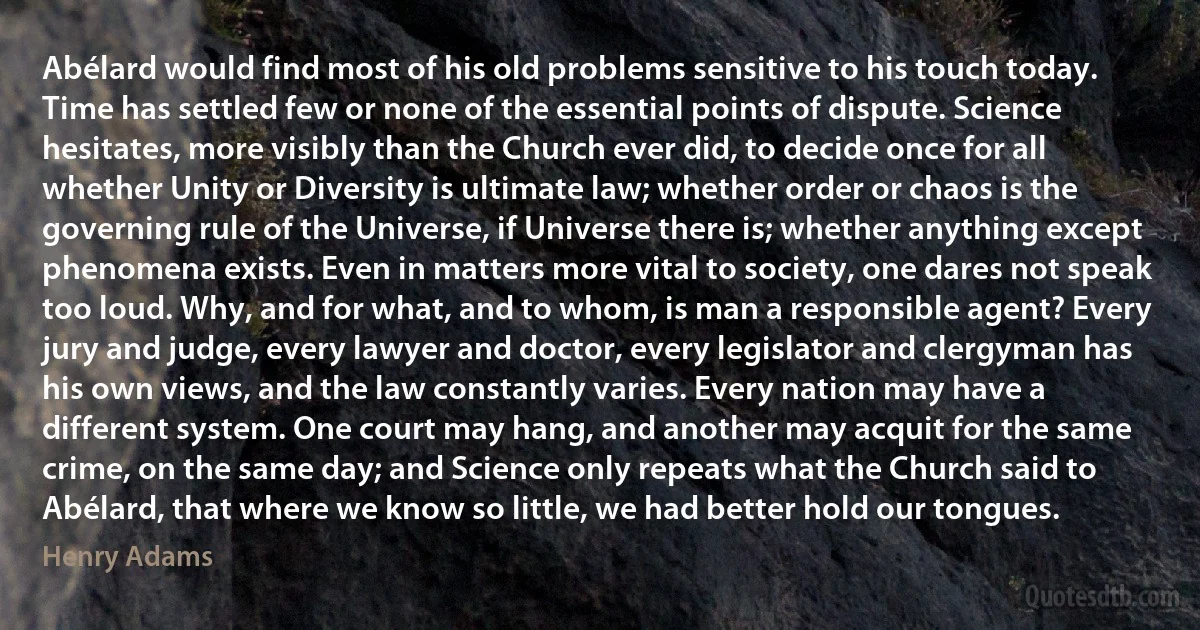
Abélard would find most of his old problems sensitive to his touch today. Time has settled few or none of the essential points of dispute. Science hesitates, more visibly than the Church ever did, to decide once for all whether Unity or Diversity is ultimate law; whether order or chaos is the governing rule of the Universe, if Universe there is; whether anything except phenomena exists. Even in matters more vital to society, one dares not speak too loud. Why, and for what, and to whom, is man a responsible agent? Every jury and judge, every lawyer and doctor, every legislator and clergyman has his own views, and the law constantly varies. Every nation may have a different system. One court may hang, and another may acquit for the same crime, on the same day; and Science only repeats what the Church said to Abélard, that where we know so little, we had better hold our tongues.
Henry AdamsRelated topics
agent anything church clergyman court crime day different doctor few find hang hold judge law lawyer legislator loud man nation none once order rule say science sensitive speak time touch ultimate vital today pointsRelated quotes
Contemplating the universe, the whole system of creation, in this point of light, we shall discover, that all that which is called natural philosophy is properly a divine study- It is the study of God through his works - It is the best study, by which we can arrive at a knowledge of the existence, and the only one by which we can gain a glimpse of his perfection.
Do we want to contemplate his power? We see it in the immensity of the Creation. Do we want to contemplate his wisdom? We see it in the unchangeable order by which the incomprehensible Whole is governed. Do we want to contemplate his munificence? We see it in the abundance with which he fills the earth. Do we want to contemplate his mercy? We see it in his not withholding that abundance even from the unthankful. In fine, do we want to know what God is? Search not written or printed books, but the Scripture called the Creation.

Thomas Paine
With what moral authority can they speak of human rights - the rulers of a nation in which the millionaire and beggar coexist; the Indian is exterminated; the black man is discriminated against; the woman is prostituted; and the great masses of Chicanos, Puerto Ricans, and Latin Americans are scorned, exploited, and humiliated? How can they do this - the bosses of an empire where the mafia, gambling, and child prostitution are imposed; where the CIA organizes plans of global subversion and espionage, and the Pentagon creates neutron bombs capable of preserving material assets and wiping out human beings; an empire that supports reaction and counter-revolution all over the world; that protects and promotes the exploitation by monopolies of the wealth and the human resources of whole continents, unequal exchange, a protectionist policy, an incredible waste of natural resources, and a system of hunger for the world?

Fidel Castro
The Apostles were put to death; they were hunted from nation to nation; they wandered about in sheep skins and goat skins in the dens and caves of the earth, of whom the world was unworthy. Their followers were put to death by hundreds, by thousands, by tens of thousands; and after a while there sprang up a people that pretended to be Christians--followers of the meek and lowly Jesus, having no apostles, no inspired men, no revelation, no ministration of angels, none of the characteristics, except a few forms, of the Christian Church as it existed in the first century of the Christian era. This class of men, calling themselves Christian, uniting with the various forms of the pagan religion, adopting many of their ceremonies and institutions, became very popular, and finally some of the pagans embraced Christianity and were placed, as it were, upon the throne, and what they termed Christianity became very popular indeed.

Orson Pratt
He loved his profession, he had a real sense of dedication to the administration of justice, he held his head high as a lawyer, he rendered and exacted courtesy, honor and straightforwardness at the Bar. He respected the judicial office deeply, demanded the highest standards of competence and disinterestedness and dignity, despised all political use of or trifling with judicial power, and had an affectionate regard for every man who filled the exacting prescription of the just judge. The law to him was like a religion, and its practice was more than a means of support; it was a mission. He was not always popular in his community, but he was respected. Unpopular minorities and individuals often found in him their only mediator and advocate. He was too independent to court the populace - he thought of himself as a leader and lawgiver, not a mouthpiece.

Robert H. Jackson
It is great comedy to hear the secular, pro-gay left, so hostile to states' rights in virtually every instance, suddenly discover the tyranny of centralized government. The newly minted protectors of local rule find themselves demanding: "Why should Washington dictate marriage standards for Massachusetts and California? Let the people of those states decide for themselves.” This is precisely the argument conservatives and libertarians have been making for decades! Why should Washington dictate education, abortion, environment, and labor rules to the states? The American people hold widely diverse views on virtually all political matters, and the Founders wanted the various state governments to most accurately reflect those views. This is the significance of the 10th Amendment, which the left in particular has abused for decades.

Ron Paul
